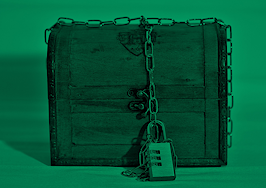The Department of Justice (DOJ) has been waging an all-out war against the National Association of Realtors (NAR) largely because of their commission policies. Since those probes were launched, it seems that almost every day a new article hits my email inbox with an opinion on the topic of higher fee traditional brokers and the new lower fee disruptors.
If you want to view this debate in real time, spend some time on any of a number of agent social media groups and you’ll see they are flooded with posts of someone who lost a deal to a lower fee competitor. Agents in these groups are pleading for their peers to hold the line, stand firm on their higher fees, don’t devalue themselves and to know their worth.
These conversations quickly devolve into name-calling, but I think many agents are forced to consider a choice they have been brainwashed to hate:
“Should I lower my fees?”
My wife, Kelly, and I answered emphatically “Yes” when we founded 1 Percent Lists, a full-service “discount brokerage” that has seen incredible growth both locally in Louisiana and nationally since 2020 when we started franchising. We created this company because we wanted to spend more time doing deals and less time trying to find them. We wanted a better work-life balance.
We don’t mind charging a little less and doing more deals; just please don’t ask us to cold call or door-knock for hours on end. We are obviously in the minority when it comes to our views on the subject.
The overwhelming majority of agents are trained by their brokers and peers early on not to deviate from the “accepted” office commission rate. These new agent entrepreneurs launch their new businesses and are literally trained not to think like any other entrepreneur or business owner would. I would argue that our peers have been forced into false choices regarding their real estate careers.
False choice
When considering sales commissions, should an agent maintain the status quo, continue striving for the higher fees and hold the line with their fellow agents, or should these agents “sell out,” lower their fees, work harder and earn less money?
Contrast this flawed reasoning most agents adhere to with the actual innovative mindset that successful entrepreneurs have. Businesses across the world, from tiny startups to Fortune 500 companies, ask themselves a very simple question regarding every service they offer or product they sell.
Real choice
What is the sweet spot for pricing a product or service that will provide the most profit based on client acquisition costs and volume sold?
In more simple terms, what should I charge to net me the most profit? I would be willing to bet Apple asks this question when launching a new product. I would guess Tesla, Amazon, Google and every other successful company both big and small does, too.
Listings are gold for real estate agents, so consider this: If I cold-called 100 for sale by owners today and tried to get them to list their home at 6 percent (3 percent each side, list and buy), how many would I convert? If I cold-called the same 100 FSBOs and tried to list their homes for only 3.5 percent (1 percent list side, 2.5 percent buy side) commission offering the same level of service, how many would I convert?
Which scenario gives me the most listings? Which scenario is more likely to generate more buyers, increase my sphere and generate the most long-term profit?
The fact that agents and brokers refuse to ask themselves this question is the very reason that the DOJ is so interested in us, isn’t it?
Every agent knows in their heart that charging less and putting a ton of signs in the ground is faster, more efficient, less stressful and ultimately more profitable — but they never seem to make that choice. Their loyalty to a higher commission model blinds them from considering a different business concept that many other entrepreneurs would choose.
New agents are trained to buy more leads, grind harder or join teams and give up half their money. They never seem to get trained to reduce their fees to get some deals under their belt, learn and build their sphere. Instead, these newbies are taught to charge the same fees as the veteran agents around them with years of experience and a track record of success. Is it any wonder so many fail?
I think many agents are too proud to consider a lower price model to generate listings even if they are struggling. I believe the reason they are unable to generate business is that the public believes agents are offering the same services at the same cost and frankly everyone knows several agents.
The supply of new, inexperienced agents continues to rise, which means our value declines. Potential clients simply don’t see a real value proposition.
Oddly enough, many of these agents are strangely comfortable spending their money purchasing buyer leads from big tech and grinding out those high-effort deals. This seems to be a socially acceptable move for agents who can’t get listings, but this is the great tragedy of our profession.
Agents are completely at peace with paying big money to big tech so they can be provided a deal because that doesn’t make them a “discounter.” Unfortunately, those same agents refuse to consider providing themselves a deal by charging lower fees and offering real value to a client. In short, feeding the big tech beast that is out to destroy our profession is more socially acceptable for the average agent than saving their clients money.
I believe that a willingness to work harder for longer than everyone else to get ahead may work to some extent, but it’s certainly not in keeping with my concept of working smarter. I do think buying leads makes client acquisition dramatically easier, though it does eat into your bottom line. But that sounds eerily similar to what lower fee disruptors are doing doesn’t it? A little less profit, a lot more easy deals.
So why not charge less to list homes, get a big market share of listings, then use that massive book of listings to generate buyer leads and listing leads? In that situation, at least your buyer lead generation is now a profitable business, listing lots of homes.
For the few disruptive companies that have made the choice to charge a lower fee structure and generate more business, almost all of them have chosen the path that is viewed as very “anti-agent.” These companies are turning agents into employees who are given salaries and paid small bonuses for the properties they sell.
Do great salespeople really want to be employees? After all, if we accept the safety net we also install the glass ceiling right? This presents another false choice for the agent.
False choice
Should I remain an independent contractor with no boss, unlimited income potential and total freedom, or be an employee with a job at a lower fee brokerage and lose my freedom and income potential?
Contrast this false choice with the logic that any other forward-thinking entrepreneur or company would use:
Real choice
If I have a much stronger value proposition, how can I use that to reduce my client acquisition time and cost while generating higher profits by doing more volume, more easily? Would that make me wealthier and happier because I spend more time doing deals (which I like) and less time trying to find deals (which I hate)?
Those of us who have made the choice to charge lower fees have a much better value proposition for our clients, and we use that to capture more listings. We use those listings to generate more buyers.
We are surrounded by thousands of agents with incredibly similar business models and fees all trying to convince the public they are the best. My task of simply convincing the world that I exist and am just as good for a fraction of the cost is a much lower hurdle to jump.
They say we aren’t any good because we charge less. I say we are better because we do a lot more deals, so we have more experience and know the market better.
Our peers often berate us as being “bad for the industry.” From my perspective, if an agent can charge less, grind less, sell more, profit more and save their clients’ money, how can that possibly be bad for the industry?
If that is truly bad for the industry, should we be so shocked that the industry itself has been under such recent scrutiny by the DOJ?
Grant Clayton has been a Realtor since 2011 and is a second-generation real estate professional. The Clayton family business is commercial real estate development which has been in operation since the mid-1970s and has completed many monumental projects in and around the city of New Orleans.













